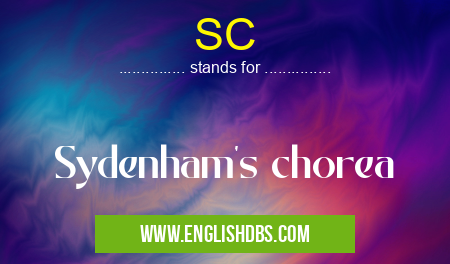What does SC mean in THERAPY
SC is an abbreviation for Sydenham's chorea, also known as rheumatic chorea. It is a neurological disorder that affects children and is characterized by involuntary, purposeless movements of the body, particularly the face, limbs, and trunk. SC is often associated with rheumatic fever, an inflammatory condition that can affect the heart, joints, and brain.

SC meaning in Therapy in Medical
SC mostly used in an acronym Therapy in Category Medical that means Sydenham's chorea
Shorthand: SC,
Full Form: Sydenham's chorea
For more information of "Sydenham's chorea", see the section below.
Causes
SC is caused by an autoimmune reaction that occurs after a streptococcal infection, such as strep throat or scarlet fever. The body's immune system mistakenly attacks the brain's basal ganglia, a region involved in controlling movement. This inflammation leads to the characteristic involuntary movements of SC.
Symptoms
The symptoms of SC typically appear 2-6 weeks after a streptococcal infection. They can range from mild to severe and may include:
- Involuntary, purposeless movements of the face, limbs, and trunk
- Grimacing
- Tongue thrusting
- Difficulty with speech and writing
- Emotional lability
Diagnosis
SC is diagnosed based on a physical examination and a patient's history of a recent streptococcal infection. Blood tests may be ordered to confirm the diagnosis and rule out other conditions.
Treatment
Treatment for SC focuses on managing the symptoms and preventing complications. Medications such as anti-inflammatory drugs and dopamine blockers can help reduce the involuntary movements. Antibiotics are prescribed to treat the underlying streptococcal infection. In some cases, physical therapy may be recommended to improve coordination and balance.
Essential Questions and Answers on Sydenham's chorea in "MEDICAL»THERAPY"
What is Sydenham's chorea (SC)?
SC is a childhood-onset neurological disorder characterized by involuntary, purposeless movements (chorea) and emotional disturbances. It typically develops in children between 5 and 15 years old and is associated with a preceding infection, usually streptococcal pharyngitis (strep throat).
What are the symptoms of SC?
Symptoms of SC include:
- Involuntary, irregular, and purposeless movements involving the face, limbs, and trunk
- Grimacing, tongue protrusion, and other facial tics
- Emotional lability, irritability, and anxiety
- Fatigue and weakness
- Difficulty with coordination, balance, and fine motor skills
What causes SC?
SC is believed to be an autoimmune disorder triggered by an infection with group A streptococcus (GAS) bacteria. After a GAS infection, the body's immune system mistakenly attacks certain areas of the brain, including the basal ganglia, which is responsible for movement control.
How is SC diagnosed?
Diagnosis of SC involves a thorough medical history and physical examination. Doctors will assess the child's movements, symptoms, and any recent infections. Blood tests and imaging studies (such as MRI) may be ordered to rule out other conditions with similar symptoms.
What is the treatment for SC?
Treatment for SC typically involves:
- Antibiotics to eradicate any remaining GAS infection
- Medications to control the involuntary movements (chorea)
- Physical therapy to improve coordination and balance
- Emotional support and counseling to address emotional disturbances
What is the prognosis for SC?
Most children with SC recover fully within 6-9 months. However, some may experience persistent symptoms or develop other neurological complications, such as obsessive-compulsive disorder (OCD) or attention deficit hyperactivity disorder (ADHD).
Final Words: SC is a neurological disorder that affects children and is characterized by involuntary movements. It is caused by an autoimmune reaction after a streptococcal infection. Symptoms can be managed with medications and supportive therapies. Early diagnosis and treatment are important to prevent long-term complications.
SC also stands for: |
|
| All stands for SC |
